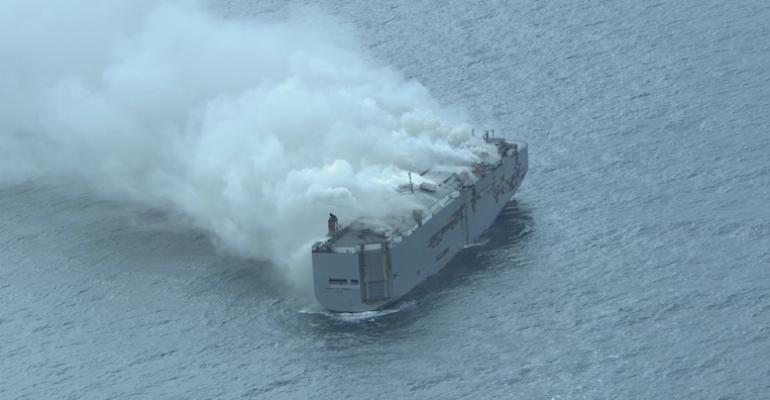As the burnt-out hull of the Fremantle Highway settles in the Dutch port of Eemshaven the Paris and Tokyo Memoranda of Understanding are collaborating to inspect the fire safety arrangements on the world’s fleet over a period of three months starting on 1 September.
The annual CIC is essentially an open book exam, with questions released in advance, which no ship or its crew should fail.
This year, however, the CIC will be conducted with the backdrop of an increase in incidents. Notwithstanding the Fremantle Highway fire, insurance company Allianz Global Corporate & Specialty reported in its annual Shipping and Safety Review published in June 2023 that fire and explosions were at their highest for a decade.
Some 209 ship fires in 2022, 17% higher than the previous year, with 13 of these fires on car carriers saw insurance claims for cargo losses become the most expensive cause of marine insurance claims in the year, according to Allianz.
Fire represents one of the most devastating accidents that can take place aboard a ship and the analysis of the last five years of Paris MoU PSC reports has consistently highlighted concerns about onboard fire safety.
Even so a maritime fire safety expert pointed out that CICs review of existing regulations are inadequate, what is necessary is to update fire regulations for the industry to take into account the new and often devastating fires that can occur on board ships through lithium-ion batteries.
He told Seatrade Maritime News, “CICs can only check existing statutory compliance which all parties know is insufficient and far behind technological advances in cargo such as electric vehicles. And by the time rules are debated and addressed, the cargo technology has moved ahead.”
He added that regulatory changes, “Can only be made by flags [states]. But any flag that raises its head above the parapet will lose tonnage while regs are being debated. That’s why nobody is raising it,” explained the expert.
Pointing to the broad spread of lithium-ion battery cargo that poses a challenge for regulatory authorities to prescribe new rules, he said, “Maybe when the technology dust settles, a flag may raise it. Until then we can only hope no more fires and such CICs on fire safety.”
He added, “Maybe it’s better for insurers to demand more systems or put a cap on the number of EV units rather than such CICs.”
In this expert’s view there needs to be a reduction in detection and decision times with an increase in specific extinguishing and containment systems for EV carriage rather than CICs.
In the meantime, a joint statement Paris and Tokyo MoU said: “The purpose of the campaign is to create awareness among the ship’s crew and owners about the importance of fire safety measures and to verify that the ship complies with fire safety requirements under the relevant IMO instruments.”
Port State Control officers from around the globe will use a questionnaire on fire safety equipment and systems and will check to see that all crew are familiar with firefighting equipment and that these items are properly maintained.
The results of the CIC will be analysed and presented to the governing bodies of both MoUs, with the possibility that these results will be passed on to the IMO.
While the cause of the blaze that ripped through the Fremantle Highway has yet to be determined, it is notable that fire regulations remain behind the curve and industry experts say that CIC’s and the Paris and Tokyo MoUs cannot address that problem.
Copyright © 2024. All rights reserved. Seatrade, a trading name of Informa Markets (UK) Limited.
Add Seatrade Maritime News to your Google News feed.  |

